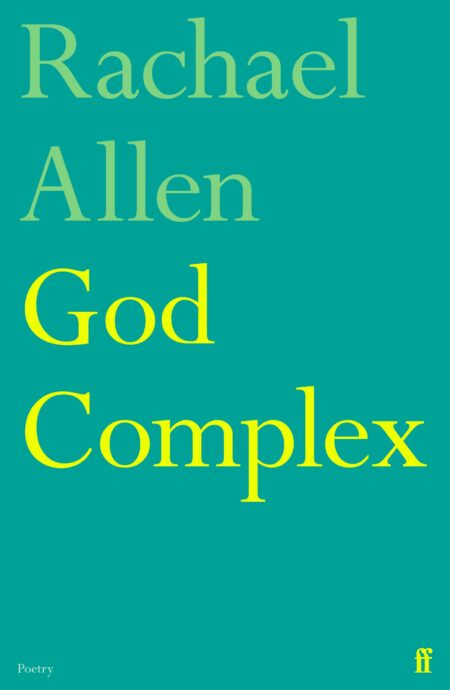God Complex (Shortlisted, Forward Poetry Prize Best Collection)
Rachael Allen
(Faber, 2024); pbk; £12.99
God Complex is a study in toxicity, focusing on a poisoned self, a poisoned relationship and a poisoned environment. Its fascination with the darkness of its subject makes for a difficult but compelling read. Rachael Allen’s new collection is an extensive narrative meditation on various forms of breakdown—and also attempts to recover—written at what feels like the point of exhaustion. It also examines gender, gender-based violence, aspects of class politics, and the many wrongs which society does to its othered own.
The curious title is referenced in the introductory verses—but who is the titular God here? Initially, it feels like the author themselves;
Perhaps
I have a deity in me —
lucid angel in the soft reflection [.]
As the collection unfolds, the God splinters into many things beyond the self—an abusive lover, the pain of illness—but Allen returns to her theory;
I […] imagine a god breaking through the landing
but the god is me.
The image of a river—a familiar poetic metaphor for such journeys—looms large in the centre ground of the long narrative, but this is a journey where few fellow travellers seem benign. The river threatens by turns to carry the writer away, to burst its banks, to drown them. Allen harnesses the power of this metaphor to great effect as they explore the inhabitants of the river, and how it represents their post-disease, post-relationship trauma;
Pain is that fish who
wears a parasite for a tongue; like how I wear you as a frontis-
piece.
The poet has an inexhaustible stock of arresting images—by turns physical, environmental, unnatural and sometimes grotesque,
Splash me
nastily with science.
I would like the red
goo on my face.
or, even more provocatively,
Sometimes I feel the edges of my teeth bleed and taste
metal in my mouth, like a big iron dick
is in there,
or is it that
I’m just bleeding
from the gums again.
The language supporting the welter of imagery is naturally rich and varied, with occasional and unexpected diversions into curious archaic registers. An eight-line meditation begins, ‘Around around the mulberry bush’ before using ‘trappeth’ and ‘cometh’, which takes the poem and the reader to an uncertain place and time. It feels unsettling, as if the reader isn’t already unsettled.
While the tone of God Complex is consistently paranoid and forceful, the poet’s approach to form is more agile. Sections of dense prose-poems interact with lean bullets of verse—a page typically contains no more than 20 lines, but often far fewer. Such economy demands that nothing be said twice and no line of enquiry be extended too far into abstraction. The emotions conveyed by these poems seem uncontrived – though are clearly crafted for impact and certainly pack a punch, despite the apparent fragility of their author.
The poetic journalling of trauma is neither new nor unusual. What is it therefore that raises this collection sufficiently above others to bring it to the attention of the Forward panel in 2024? Possibly it is the ambition—the perceived need to work through complex ideas of violence and recovery and then to scale these ideas up from micro to macro. The anger at and resistance to violence against the self and to women is the same anger directed at those who pollute the environment, and the same anger at the carcinogens that pollute the body. In some poems, the thesis of resistance is clearly aimed at a single subject; in others, it is applicable to several or even all those subjects. The collection does what good poetry strives to do—to see the great in the small, and the parallels between one experience and another.
God Complex is much more than a self-indulgent diary of personal and environmental trauma; it is an ambitious attempt to make genuine sense of those things and more, on behalf of the reader as well as the writer. Like the most potent toxins, this emotional concoction will remain in one’s system for a long time.
Andy Jackson


Leave a Reply